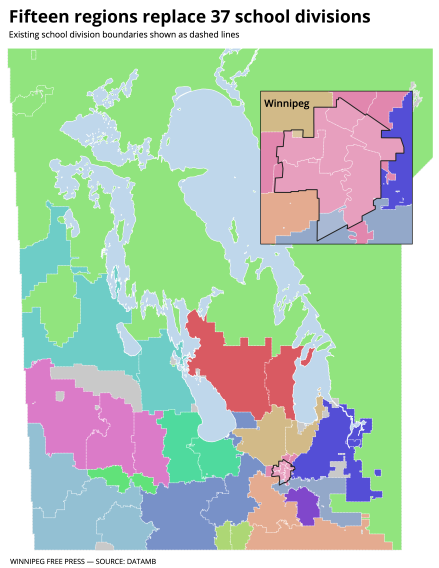Tory bill plans rewrite of Manitoba education system
Read this article for free:
or
Already have an account? Log in here »
To continue reading, please subscribe:
Monthly Digital Subscription
$0 for the first 4 weeks*
- Enjoy unlimited reading on winnipegfreepress.com
- Read the E-Edition, our digital replica newspaper
- Access News Break, our award-winning app
- Play interactive puzzles
*No charge for 4 weeks then price increases to the regular rate of $19.00 plus GST every four weeks. Offer available to new and qualified returning subscribers only. Cancel any time.
Monthly Digital Subscription
$4.75/week*
- Enjoy unlimited reading on winnipegfreepress.com
- Read the E-Edition, our digital replica newspaper
- Access News Break, our award-winning app
- Play interactive puzzles
*Billed as $19 plus GST every four weeks. Cancel any time.
To continue reading, please subscribe:
Add Free Press access to your Brandon Sun subscription for only an additional
$1 for the first 4 weeks*
*Your next subscription payment will increase by $1.00 and you will be charged $16.99 plus GST for four weeks. After four weeks, your payment will increase to $23.99 plus GST every four weeks.
Read unlimited articles for free today:
or
Already have an account? Log in here »
Hey there, time traveller!
This article was published 15/03/2021 (1730 days ago), so information in it may no longer be current.
Sweeping changes in a new education reform bill propose Manitoba’s 37 public school boards be abolished and replaced with a single education authority made up of government appointees.
On Monday afternoon, the Progressive Conservatives released the K-12 education review, a list of lessons learned from the COVID-19 pandemic era in education, and introduced the Education Modernization Act (Bill 64) to take action on the two items above.
If the 303-page legislation is approved as is, changes will be wide-ranging, from the education funding model to the creation of a new collective bargaining entity that represents only principals and vice-principals to the dissolution of all but one school board.
The Division scolaire franco-manitobaine will remain mainly intact, however, owing to minority language rights.
Education Minister Cliff Cullen said the province plans to put in place an education authority, which will oversee 15 regional entities, by July 1, 2022.
“What we do need is a system that is consistent, efficient and student-focused,” Cullen said during a news conference held at 3:30 p.m., just as final-day bells rung out in schools across the province.
“One that works with others to ensure we are improving student outcomes. One that puts parents’ voices front and centre. And one that shifts resources from the boardroom to the classroom.”
Cullen cited Manitoba’s lagging standardized student test results (which critics say must be contextualized by child poverty rates) and both higher per capita trustee counts and board administration costs in comparison to other provinces as reasons for much-needed change.
Approximately three per cent of school board expenditures in Manitoba are spent on administrative costs.
Cullen said proposed changes are estimated to redirect $40 million back to classrooms. He would not provide an estimate for the number of related job losses expected.
The new education authority is to be made up of between six and 11 people, at least two of whom must be parents of current public school students, who serve on the provincial advisory council on education. The authority’s board will appoint a chief executive officer.
The authority may also determine the number and type of schools in each regional catchment area and “the official school programs and courses of study offered at each school.”
The six existing Winnipeg-area school divisions will be consolidated into one region.
The proposal conflicts with the recommendations from the K-12 commission. It suggested Manitoba consolidate its public school boards into six to eight regional boards, with boards consisting of five to seven trustees — the majority of whom would be appointed and the others elected.
Reflecting on the changes proposed, the president of the Manitoba School Boards Association called Monday “a really sad day for Manitoba.”

“All Manitobans should be embarrassed by what the government has rolled out today, when it comes to snuffing out any hope of democratic accountability for public education,” said Alan Campbell, who has served as an elected trustee in the Interlake School Division for the last decade.
Campbell likened the new setup to Shared Health, with regional entities that answer to a board appointed by the province.
Partisan critics echoed concerns about the legislation giving government ultimate authority.
“If you’re the average parent and have an issue with your child now, you can take it up with your local school trustee. After the new education bill passes, you’re going to have to take it up with Mr. Pallister,” Opposition NDP Leader Wab Kinew said Monday.
The bill concentrates more power with the premier and cabinet, including power over setting education policy and hiring school principals, Kinew said.
Liberal Leader Dougald Lamont described the legislation as an “assault on public education.”
“Everyone in the school system has worked incredibly hard to make things work (during the COVID-19 pandemic) and the reward is going to be a kick in the teeth from this government,” Lamont said.
The province wants to create volunteer parent-run councils at the individual school level, which will focus on local decision-making.
A “parental engagement officer” at each school will liaise with the community council.
The executives on these so-called school community councils will elect a member from each region to sit on a provincial advisory council on education. The francophone school board will also elect one of its trustees to sit on the advisory council.
The advisory council’s role, per Bill 64, is to advise the minister of matters related to education, from student needs to assessment effectiveness.
Each individual member will be expected to meet with the director of education in charge of their region — the equivalent of current superintendents — at least four times a year to discuss local school matters.
Meantime, the Manitoba Teachers’ Society said Monday there is much still to digest about the bill and education review.
Vice-president Nathan Martindale said the union, however, is ready to fight with full force the removal of school leaders from MTS. Such a change would affect the culture in schools and create tensions between principals and teachers, he said.
While many of the K-12 report’s 75 recommendations are not directly addressed in Bill 64, Cullen said the province has accepted all of them “in spirit and principle.”
— with files from Carol Sanders
maggie.macintosh@freepress.mb.ca
Twitter: @macintoshmaggie
wfppdf:https://wfpquantum.s3.amazonaws.com/pdf/2021/93113_b064.pdf|Bill 64 The Education Modernization Act:wfppdf

Maggie Macintosh reports on education for the Winnipeg Free Press. Funding for the Free Press education reporter comes from the Government of Canada through the Local Journalism Initiative.
Our newsroom depends on a growing audience of readers to power our journalism. If you are not a paid reader, please consider becoming a subscriber.
Our newsroom depends on its audience of readers to power our journalism. Thank you for your support.
History
Updated on Monday, March 15, 2021 4:13 PM CDT: Replaces PDF with text of bill.
Updated on Monday, March 15, 2021 7:25 PM CDT: Full write-thru with new interviews, extra info, formatting, map
Updated on Tuesday, March 16, 2021 9:38 AM CDT: Minor copy editing changes


















